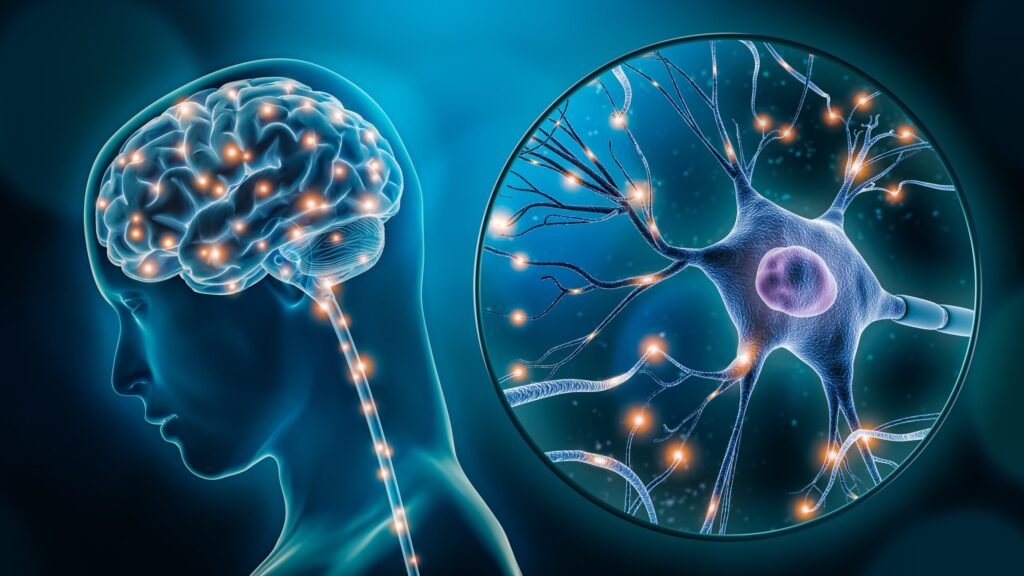
The neurological impact of essential oils is a fascinating area where ancient healing meets modern science. While the soothing scents of oils like lavender and eucalyptus have been valued for centuries, the scientific exploration of their effects on brain function is still evolving. The olfactory system, our sense of smell, plays a pivotal role in this process, acting as a direct pathway to the brain.
Understanding how the brain responds to these natural aromas offers insight into how essential oils can influence mental health and cognitive function. This article delves into the intricate relationship between essential oils and the brain, breaking down the olfactory pathways and how oils like lavender and eucalyptus enhance brain function.
By exploring the neurological processes triggered by essential oils, we can better appreciate their powerful impact on mood, stress relief, and cognitive enhancement. With scientific backing, essential oils go beyond pleasant aromas—they are powerful tools for mental well-being.
The Olfactory System: Gateway to the Brain

How the Olfactory System Works
The olfactory system is uniquely connected to the brain, allowing essential oils to have a profound impact on neurological functions. When you inhale essential oils, odor molecules interact with olfactory receptors in the nasal cavity. These receptors send signals directly to the olfactory bulb, which is connected to the brain’s limbic system—responsible for emotions, memories, and certain autonomic functions.
This direct connection between smell and brain function explains why scents have the ability to trigger powerful emotional and physiological responses. Studies have shown that different aromas can activate various areas of the brain, impacting everything from memory recall to mood regulation. To dive deeper into how the olfactory system processes essential oils, you can explore this detailed guide.
The Limbic System: Emotional Regulation and Memory

The olfactory system’s connection to the limbic system is crucial in understanding how essential oils affect mental health. The limbic system controls emotions, mood, and long-term memory, making it highly responsive to scents. For example, the smell of lavender has been shown to reduce anxiety by calming the amygdala, a region responsible for fear and stress responses.
Furthermore, eucalyptus oil has been found to stimulate mental clarity by interacting with the hippocampus, the brain’s memory center. This explains why certain scents are not only calming but can also enhance focus and cognitive performance.
Pathways Beyond the Limbic System
While the limbic system is the primary target, essential oils can also affect other neurological pathways. For instance, some studies suggest that inhaling specific oils influences the hypothalamus, which regulates hormones and the body’s stress response. Essential oils like peppermint and rosemary may stimulate the release of dopamine, a neurotransmitter associated with motivation and pleasure.
For a deeper understanding of these pathways and how essential oils impact the brain, check out this comprehensive article.
Lavender Oil: A Calming Influence on the Brain

Lavender and Its Impact on Stress Reduction
Lavender oil is one of the most researched essential oils, known for its ability to reduce stress and promote relaxation. Inhaling lavender stimulates the parasympathetic nervous system, which is responsible for calming the body and reducing stress levels. Scientific studies indicate that lavender can lower cortisol levels—our primary stress hormone—leading to a sense of calm and tranquility.
In a controlled study, participants exposed to lavender oil experienced reduced anxiety levels and improved mood. The olfactory system quickly transmits the scent to the brain, signaling the release of neurotransmitters like serotonin and GABA, which have calming effects on the nervous system.
Lavender and Sleep Quality
Lavender oil is also widely recognized for its ability to improve sleep quality. The scent interacts with brain receptors involved in regulating sleep cycles, helping individuals fall asleep faster and experience deeper rest. This makes lavender essential oil a natural solution for those struggling with insomnia or restless sleep.
By affecting the brain’s sleep centers, lavender oil helps regulate circadian rhythms, which are critical for maintaining mental and physical health. To explore more about how essential oils like lavender influence mood and sleep, see this article.
Eucalyptus Oil: Enhancing Cognitive Function and Clarity

Mental Clarity and Focus
Eucalyptus oil is another essential oil with powerful neurological effects, particularly in enhancing cognitive function and mental clarity. Known for its refreshing scent, eucalyptus stimulates blood flow to the brain, increasing oxygen supply and improving concentration.
Studies have shown that eucalyptus oil can boost cognitive performance by enhancing mental focus, making it an ideal choice for tasks requiring prolonged concentration. The oil’s interaction with the olfactory system leads to an increase in beta waves in the brain, which are associated with active thinking and decision-making.
Eucalyptus and Respiratory Health
While eucalyptus is primarily known for its respiratory benefits, its effects on brain function should not be overlooked. Inhaling eucalyptus not only clears the airways but also delivers oxygen-rich blood to the brain. This increased oxygen supply can enhance alertness and improve overall brain function, making eucalyptus an excellent oil for both mental and physical rejuvenation.
For more insights into how essential oils like eucalyptus work within the body and brain, explore this scientific breakdown.
Essential Oils and Brain Health: Long-Term Benefits

Neuroprotective Properties of Essential Oils
Research into the long-term neurological effects of essential oils is growing, with some studies suggesting they may have neuroprotective properties. Oils like rosemary and frankincense have been linked to enhanced memory retention and protection against neurodegenerative diseases like Alzheimer’s. These oils appear to inhibit the formation of beta-amyloid plaques, which are known to cause brain cell damage.
Lavender and eucalyptus also contain antioxidants that protect the brain from oxidative stress, which is a leading cause of cognitive decline. Regular use of these oils may contribute to better mental health and cognitive longevity.
Balancing Hormones and Brain Chemistry
In addition to their direct effects on brain function, essential oils can help balance hormones that affect mental health. The hypothalamus plays a significant role in regulating the endocrine system, and essential oils can stimulate or suppress hormone production based on the body’s needs. Oils like clary sage, for instance, have been found to help balance estrogen levels, which can indirectly influence mood and mental clarity.
By supporting hormonal balance and protecting the brain from oxidative damage, essential oils offer a holistic approach to maintaining brain health.
Conclusion

The neurological impact of essential oils is profound and multifaceted, influencing everything from stress and mood to cognitive function and long-term brain health. The olfactory system provides a direct pathway for essential oils to affect brain regions responsible for emotions, memory, and even physical health. Lavender oil, with its calming effects, and eucalyptus oil, known for boosting mental clarity, are two powerful examples of how essential oils can promote mental well-being.
Incorporating essential oils into daily life is more than just an aromatic experience—it is a science-backed approach to supporting brain function and enhancing overall health. With ongoing research into their neuroprotective properties, essential oils are poised to become an essential tool for maintaining mental health in a natural and effective way.









